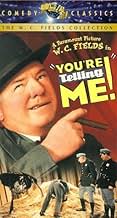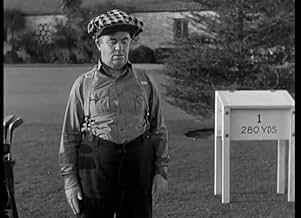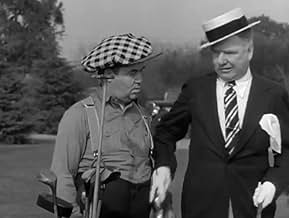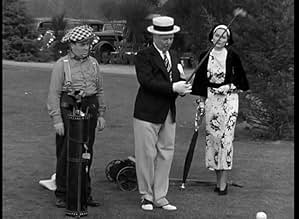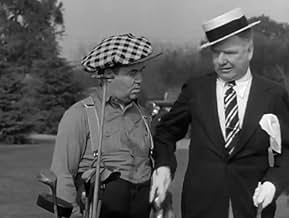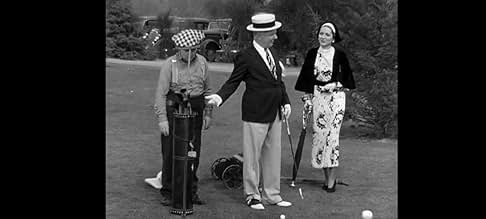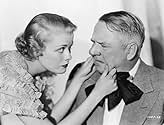NOTE IMDb
7,4/10
1,3 k
MA NOTE
Ajouter une intrigue dans votre langueA hard-drinking, socially-awkward inventor wrecks his daughter's chances of marriage into a rich family and bungles his own chances of success by selling one of his more practical inventions... Tout lireA hard-drinking, socially-awkward inventor wrecks his daughter's chances of marriage into a rich family and bungles his own chances of success by selling one of his more practical inventions.A hard-drinking, socially-awkward inventor wrecks his daughter's chances of marriage into a rich family and bungles his own chances of success by selling one of his more practical inventions.
- Réalisation
- Scénario
- Casting principal
- Récompenses
- 1 victoire au total
Buster Crabbe
- Bob Murchison
- (as Larry 'Buster' Crabbe)
Dell Henderson
- Mayor
- (as Del Henderson)
Robert McKenzie
- Charlie Bogle
- (as Robert Mc Kenzie)
William Bailey
- Tire Company Executive
- (non crédité)
Eddie Baker
- First Motorcycle Cop
- (non crédité)
Dorothy Bay
- Mrs. Kendall
- (non crédité)
Harold Berquist
- Doorman
- (non crédité)
Don Brodie
- Waiter
- (non crédité)
Elise Cavanna
- Sarah Smith - Female Gossip
- (non crédité)
Avis à la une
It's not often I'll thank a TV network, but Turner Classic Movies deserves heartfelt praise for broadcasting the entire Fields canon this May & June. YOU'RE TELLING ME! has many, many hilarious setpieces and throwaway bits of business - but you'd expect that from William Claude. What might surprise you is his delicate touch when pathos and tenderness are called for. The scene on the train where a despondent Fields, playing struggling eccentric inventor Sam Bisbee, accidentally meets a travelling Princess and tries to talk her out of 'suicide' (she had no such plans...but HE did, in a moment of despair) nearly brought this cynic to tears. It's not the heavy drama of the scene that affects the viewer so much as Fields' flawless playing of it. Plot contrivance it may be, but the easy, simple grace he brings to his line readings - the small, almost imperceptible shadings of wistfulness and regret in his voice, facial expressions & body language - all give testimony to this brilliant comic actor's mastery of craft, and his ability to draw water from the well of his own loneliness. Don't misunderstand; this is a side-splitting comedy. Much of the comedy is purely visual; all of it is unforgettable. But NEVER short-count WC Fields, or confuse him with an impressionist's caricature. Where other clowns tried their damndest to make you laugh till it hurts, Fields knew his gift was to create a character forever set-upon and assaulted by a blithe, uncaring parade determined to pass him by - a man who hurt till all you can do is laugh. Well, you'll laugh all through this 65-minute model of timing and economy; but watching Fields trampled underfoot again, warily rising to his feet with no higher expectation than a brief, sweet respite before his next inevitable shellacking from the fates and furies, you might just get an idea of why they called him 'The Great Man'. Much obliged, TCM.
As the film opens, it's late at night and we see an inebriated W.C. Fields slowly making his way up the walkway to his front door; as he moves along, he staggers off the path and has an encounter with a tree limb that raises havoc with his straw hat and knocks it off, which gives Fields-- the all-time master of physical comedy-- a field upon which to ply his craft to the fullest. He makes the simple task of refitting chapeau to pate engagingly hilarious. And once he makes it into the house (shoes in hand, of course, but too late!-- the little woman is waiting for him), it's more of the same, beginning with an encounter with some draperies, this time. It's classic Fields schtick, and what a great way to kick off one of his lesser known, but vibrantly funny films, `You're Telling Me,' directed by Erle C. Kenton.
Pauline Bisbee (Joan Marsh) and Bob Murchison (Buster Crabbe) are in love, and want to be married; but there's a snag: The Bisbee house is located on the `wrong' side of the tracks, and the union is meeting strong resistance from Bob's mother, Mrs. Edward Quimby Murchison (Kathleen Howard), who is ever discerning of the Murchison's place in society. And Pauline's father, Sam (Fields), is of little help. An inveterate dreamer, Sam is an inventor, and though he knows it's only a matter of time before the world beats a path to his door, his time, unfortunately, has not yet come, which leaves him in the quagmire of anonymity, and his family still on the wrong side of the tracks.
All of that is about to change, however, because Sam has at last invented something that will assure him fortune and fame: A 1000% puncture-proof automobile tire. He has an appointment in the city with a tire company, and once they see his demonstration, he knows his future will be made, Pauline will be able to marry Bob, and all will be well.
Alas, the demonstration goes awry, and the hapless Sam, dejected, disgraced and alone, boards a train for home. He thinks it's the end; but on the train, he befriends a beautiful young woman, unaware that she is a foreign dignitary, the Princess Lescaboura (Adrienne Ames), currently on a goodwill tour of America. And it turns out to be an auspicious encounter, as Sam's kindness to her is about to be repaid in a way that will change his life forever.
This film is vintage W.C. Fields, featuring all of the trademark elements that make him (and his films) so endearing and enduring, even today: The sight gags, presented in that unique Fields' way; Fields as the underdog; the innate cynicism Fields honed into a veritable art form; Fields as the hen-pecked husband (a role he played often, and perfected in `It's A Gift,' made this same year-- 1934-- with Kathleen Howard as his wife); the witty retorts; and, of course, the genuine humor. In one respect, however, this film differs from most of his others, in that, as Sam, Fields displays a gentler side of his usually caustic nature. The acerbity is present, to be sure, but toned down; and Sam, perhaps more than any character Fields ever created, is genuinely likable.
As Bob Murchison, Buster Crabbe's performance leaves something to be desired, but that charismatic spark that would make him a matinee idol later in the Sci-fi serials `Flash Gordon' and `Buck Rogers,' and later in numerous `Billy the Kid' and `Billy Carson' westerns, is evident, and most importantly, he does well enough to set the stage for the antics of the film's star.
In only her second film, Kathleen Howard is a delight in the role of Mrs. Murchison, who is something of a prototype for many who would come later in other films, such as Eulalie Mackechnie Shinn of Meredith Willson's `The Music Man.' As Bob's domineering mother, she affects an aloofness that strikes just the right chord and makes her the perfect foil for the down-to-earth Sam Bisbee.
The supporting cast includes Louise Carter (Bessie Bisbee), Tammany Young (Caddy), Dell Henderson (Mayor), James B. `Pop' Kenton (Doc Beebe), Robert McKenzie (Charlie Bogle), Nora Cecil (Mrs. Price), George Irving (Mr. Robins) and Frederick Sullivan (Mr. Edward Quimby Murchison). Comparatively short (at 66 minutes), `You're Telling Me' is nevertheless something of a minor classic and pure Fields from start to finish. Thoroughly enjoyable and highly entertaining, It even gives the inimitable W.C. a chance to perform a bit of his famous `golf' routine. A funny, and often downright hilarious film, it's a showcase for one of cinema's premiere funny men, and in the end, more than anything else, one thing is certain: It's going to make you laugh. And that's the magic of the movies. I rate this one 9/10.
Pauline Bisbee (Joan Marsh) and Bob Murchison (Buster Crabbe) are in love, and want to be married; but there's a snag: The Bisbee house is located on the `wrong' side of the tracks, and the union is meeting strong resistance from Bob's mother, Mrs. Edward Quimby Murchison (Kathleen Howard), who is ever discerning of the Murchison's place in society. And Pauline's father, Sam (Fields), is of little help. An inveterate dreamer, Sam is an inventor, and though he knows it's only a matter of time before the world beats a path to his door, his time, unfortunately, has not yet come, which leaves him in the quagmire of anonymity, and his family still on the wrong side of the tracks.
All of that is about to change, however, because Sam has at last invented something that will assure him fortune and fame: A 1000% puncture-proof automobile tire. He has an appointment in the city with a tire company, and once they see his demonstration, he knows his future will be made, Pauline will be able to marry Bob, and all will be well.
Alas, the demonstration goes awry, and the hapless Sam, dejected, disgraced and alone, boards a train for home. He thinks it's the end; but on the train, he befriends a beautiful young woman, unaware that she is a foreign dignitary, the Princess Lescaboura (Adrienne Ames), currently on a goodwill tour of America. And it turns out to be an auspicious encounter, as Sam's kindness to her is about to be repaid in a way that will change his life forever.
This film is vintage W.C. Fields, featuring all of the trademark elements that make him (and his films) so endearing and enduring, even today: The sight gags, presented in that unique Fields' way; Fields as the underdog; the innate cynicism Fields honed into a veritable art form; Fields as the hen-pecked husband (a role he played often, and perfected in `It's A Gift,' made this same year-- 1934-- with Kathleen Howard as his wife); the witty retorts; and, of course, the genuine humor. In one respect, however, this film differs from most of his others, in that, as Sam, Fields displays a gentler side of his usually caustic nature. The acerbity is present, to be sure, but toned down; and Sam, perhaps more than any character Fields ever created, is genuinely likable.
As Bob Murchison, Buster Crabbe's performance leaves something to be desired, but that charismatic spark that would make him a matinee idol later in the Sci-fi serials `Flash Gordon' and `Buck Rogers,' and later in numerous `Billy the Kid' and `Billy Carson' westerns, is evident, and most importantly, he does well enough to set the stage for the antics of the film's star.
In only her second film, Kathleen Howard is a delight in the role of Mrs. Murchison, who is something of a prototype for many who would come later in other films, such as Eulalie Mackechnie Shinn of Meredith Willson's `The Music Man.' As Bob's domineering mother, she affects an aloofness that strikes just the right chord and makes her the perfect foil for the down-to-earth Sam Bisbee.
The supporting cast includes Louise Carter (Bessie Bisbee), Tammany Young (Caddy), Dell Henderson (Mayor), James B. `Pop' Kenton (Doc Beebe), Robert McKenzie (Charlie Bogle), Nora Cecil (Mrs. Price), George Irving (Mr. Robins) and Frederick Sullivan (Mr. Edward Quimby Murchison). Comparatively short (at 66 minutes), `You're Telling Me' is nevertheless something of a minor classic and pure Fields from start to finish. Thoroughly enjoyable and highly entertaining, It even gives the inimitable W.C. a chance to perform a bit of his famous `golf' routine. A funny, and often downright hilarious film, it's a showcase for one of cinema's premiere funny men, and in the end, more than anything else, one thing is certain: It's going to make you laugh. And that's the magic of the movies. I rate this one 9/10.
Well, what did W.C. Fields ever do that was bad? Even in lesser works, he's still at least interesting to watch. You're Telling Me is his second or third best of all those I've seen. The opening sequence, the suicide sequence, and the ostrich sequence are its highlights. The golf sequence might be counted, too, but, if you've seen the short film The Golf Specialist, the one in You're Telling Me is less perfect. For one thing, Fields plays one of his nicer characters in this one. He's rather good on the dramatic side, actually. I liked the scene where he tries to convince the princess not to kill herself very much. Fields showed some true range there. Anyway, as most Fields fans know, the Great Man had two basic characters: the hen-pecked husband and the flim-flam man. In The Golf Specialist, Fields is a flim-flam man, and he needs to be quite mean-spirited to play that role. The nice character from You're Telling Me seems out of place being cruel to the caddy, no matter if the caddy deserves it or not. Also, the caddy and the woman watching Fields were much funnier in the short film than in here. I suppose if I hadn't have seen The Golf Specialist just recently, the golf sequence in You're Telling Me would have seemed a lot better. Still, the film is certainly worth a 9/10. See it if you get the chance.
In the few W. C. Fields movies that I've seen, he doesn't disappoint. I can now add to that "You're Telling Me!", wherein he plays an optometrist-inventor whose daughter's marriage plans get complicated by her fiance's mother's snobbish attitude. The protagonist's attempt to show his latest invention to some execs further complicates things. More zaniness follows.
It's not any sort of profound movie, and doesn't try to be. It's just funny. Fields, despite his personal problems, always managed to be entertaining. You're sure to like this one.
It's not any sort of profound movie, and doesn't try to be. It's just funny. Fields, despite his personal problems, always managed to be entertaining. You're sure to like this one.
10Tashtago
It's amazing how much got squeezed into this 66 minute film. "You're Telling Me" contains some of Fields best work. The golf routine at the end is classic, although a little shorter than in the previously filmed "the Golf Specialist" which features a different and even more revolting caddy. What I noticed on seeing this film again after many years is what a good actor Fields is, especially in the scene where he talks the princess out of suicide. The supporting cast is also very good especially the aforementioned Kathleen Howard. No other comedian could get away with the scene where Fields knocks himself out with one of his inventions and two scenes later is still unconscious. As a Fields fan this a 10. Favorite line: "Your alright Mayor, I voted for you in the last election...five times."
Does anyone out there know where I can find a copy of "Man on the Flying Trapeze" ? Any information is much appreciated.
Does anyone out there know where I can find a copy of "Man on the Flying Trapeze" ? Any information is much appreciated.
Le saviez-vous
- AnecdotesFields' character Bisbee describes a possible scenario involving catching burglars in the basement and drinking with them, a scenario that would be played out in a later film, Les joies de la famille (1935).
- GaffesRosita is brushing Princess Lescaboura's nails and after Rosita says, "But you must.", the Princess' hands are under the table.
- Citations
Sam Bisbee: It's a funny ol' world... Man's lucky if he gets out of it alive.
- ConnexionsReferences Le Cheik (1921)
Meilleurs choix
Connectez-vous pour évaluer et suivre la liste de favoris afin de recevoir des recommandations personnalisées
- How long is You're Telling Me!?Alimenté par Alexa
Détails
- Durée
- 1h 6min(66 min)
- Couleur
- Rapport de forme
- 1.37 : 1
Contribuer à cette page
Suggérer une modification ou ajouter du contenu manquant

